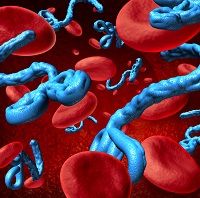CDC: Ebola Nurse Shouldn't Have Flown
News that a nurse at Texas Presbyterian Hospital in Dallas diagnosed with Ebola had earlier made a round trip to Cleveland, OH raised questions about whether voluntary isolation agreements enforced by local health authorities are adequate to protect the public from the virus. President Barack Obama canceled travel plans to hold an Ebola meeting with his cabinet and a new report found the virus could spread through respiratory secretions--contrary to what the feds have been saying.

News that a second nurse at Texas Presbyterian Hospital in Dallas diagnosed with Ebola had earlier made a round trip to Cleveland, OH raised questions about whether voluntary isolation agreements enforced by local health authorities are adequate to protect the public from the virus.
This morning the White House press office announced that President Barack Obama had cancelled a scheduled campaigning trip to support candidates in New Jersey and Connecticut to hold a special cabinet meeting this afternoon on containing the spread of Ebola.
In other Ebola news, the Center for Infectious Disease Research and Policy and the University of Minnesota said its researchers have concluded that—contrary to statements from the federal government, it is possible for an Ebola patient to transmit the virus through aerosolized droplets such as from a cough or sneeze. The proper use and design of personal protective equipment (PPE) is a major concern of health officials trying to contain the spread of Ebola. Nurses in Dallas have complained through their union that they have inadequate PPE and training in how to use it.
In Dallas, the latest infected patient was scheduled today to be transferred from Texas Presbyterian to Emory Hospital in Atlanta, GE, one of 4 federally designed facilities with bio containment units well equipped to handle patients with Ebola.The nurse, identified as Amber Joy Vinson, is one of 76 people known to have had contact with Thomas Eric Duncan, the visitor from Monrovia, Liberia who died at the hospital of an Ebola infection.
Earlier today, at a news conference, US Centers for Disease Control (CDC) Director Thomas Frieden, MD alluded to apparent lapses in Dallas.
“That patient should not have traveled,’’ Frieden said. Health care workers are not supposed to use public transportation while being monitored for Ebola infection, he said.
He said the nurse was not symptomatic when she left Dallas. But on Monday, when she boarded a plane in Cleveland to return to Dallas on a Frontier Airlines flight, she had a fever of 99.5 degrees. That is below the threshold the CDC has set in the airport traveler temperature screenings now used in detaining passengers arriving from West Africa, Frieden said.
Frieden said that while her fever was low-grade, taken with the fact that the nurse was “in an exposed group” she should not have been using public transportation. Fortunately, Frieden said the fact that the nurse’s illness was caught in the early stages when it was far less likely to be contagious “would suggest the risk if any would have been extremely low,” for anyone who had contact with her.
The CDC announced earlier today that with Frontier Airlines it was trying to contact 132 passengers on that plane. Frontier said the plane had been taken out of service.
“This second case is very concerning,” Frieden added. In Cleveland, health officials held a news conference this afternoon to reassure the public that there was a low risk of anyone contracting Ebola from the nurse.
Meanwhile, Frieden said, “The CDC is reviewing its protocols,” and investigating how well Dallas officials and the hospital had implemented them.
Later, at a White House news conference, presidential press secretary Josh Earnest said it is “evident in Dallas that we saw gaps in the system” that enabled nurse Vinson to make the trip.
Vinson, who graduated from high school in Akron, OH and got her nurse training at Kent State University, went home to see friends and family there on Oct. 8—the day Duncan died—and returned on Oct. 13. According to media reports in Cleveland, OH, she was there to make plans for her upcoming wedding.
In the White House briefing, Earnest said the president’s position on the handling of the outbreak is that while the response has not been flawless, “Fighting Ebola is hard and pointing fingers of blame will not be constructive.”